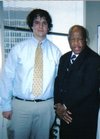Turmoil at Ebenezer Baptist Church
It seems a bit of turmoil is brewing at the historic church where the Rev. Dr. Martin Luther King Jr. served as co-pastor alongside Daddy King from 1960 until his death in 1968.
A handful of church members protested Sunday morning in front of Ebenezer Baptist Church, decrying the ouster of the historic church’s choir director and demanding the Rev. Raphael Warnock step down as senior pastor.
The six demonstrators held placards reading “Warnock Lies” and “Bring Back Dr. Uzee Brown,” a reference to the recently departed choir director who heads the Department of Music at Morehouse College.
One protester, former choir member Gloria Bell, was handcuffed and taken away by National Park Service rangers in front of the church where she was baptized more than 50 years ago.
The protestors are insisting that the pastor has shaken up the church staff without regard to the feelings of some longtime members. They also are accusing the pastor of refusing to share the church's finances with them.
If we're to believe the Deacon chairman who is quoted, this is much ado about nothing. Although, the pastor did apparently address the controversy during the 8am service before the protestors began their sidewalk protesting. So, it seems that turmoil is indeed brewing.
However, the short quote from the pastor is what I find most troubling. From the AJC article:
Warnock addressed the controversy during the 8 a.m. service, telling worshipers that while they might not understand everything he does, they must trust in his plans for the future. “Any effort to plant the seeds of dissension in the church is by definition a demonic effort,” he said to cheers from the congregation. “I’m glad that the devil has no power here.”
This Pastor as Supreme Ruler mentality is not atypical in Baptist churches these days. A Baptist pastor can create a vision, a plan for the future. But that Baptist pastor needs the congregation to first approve his/her vision before it is implemented. If the congregation is not involved in the decision-making process, why even keep the name "Baptist" on the sign out front?
Further, the implication that those who dare voice dissent are engaged in a "demonic effort" is ridiculous. The pastor of such a historic church should have more respect for the right to dissent.
I'm not sure that taking to the streets to protest your pastor is the best way to dissent. But at these large Baptist churches which are Pastor-Ruled or Staff-Ruled and less than transparent, what option are the members really left with?
Whether in the streets or in the blogosphere, I think its clear that members of these big Baptist churches will continue to make public their disagreements with their pastor.
Labels: Ebenezer Baptist Church


3 Comments:
I agree entirely. It is the loss of congregationalism that makes far more likely the development of blogs, pickets, or other forms of public protest over intracongregational matters. I further agree that the tendency to label those who disagree as "demonic" can be a grave ministry weakness. Certainly there are areas of disagreement that might rise to such a level. "Shall we host a Klan rally in the sanctuary this weekend?" would fit neatly into that category, while "Who shall wave his arms while we sing our hymns on Sunday?" likely does not.
7:19 AM
Aaron,
I have been a reader of your blog, but have not had the chance to offer a post until now. I also come out of the moderate Baptist background and resonate with the aspect of your post describing the role of the congregation working with the pastor in leading and shaping the direction of the church.
However, one aspect to remember is that pastoral authority in the black church has developed differently, and historically in this stream of Baptist life pastors have greater authority in their congregations. This statememnt is not applicable to all congregations, as some have more congregational involvement and others have changed to allow congregants to have a larger voice, but a numbe4r still are pastor-led churches. Rev. Dwight Hopper, a professor at the University of Chicago Diviniy School, recently stated that "the black church is probably the only space in America where black men can have unquestioned authority," he said. "It's hard to give that up for a lot of black male pastors." (quote in Manya A. Brachear's 2007 article on Obama and Jeremiah Wright) The pastor has a role in leading and teaching that is not challenged, as well as a high reverence from the congregation (examples of this are events like annually recognizing a pastor's anniversary, where a love offering is raised). Based on this authority, congregational dissent is not as prevalent among congregations such as Ebeneezer, so when it occurs the pastor takes a harder line on his authority in the congregation. This is an area for further study among the various Baptist streams. It is also a place where conversations occurring after events like the New Baptist Covenant can assist each of us to explore how to navigate pastoral and congregational leadership.
3:00 PM
I got voted out of the church where my Momma was baptized cause of White Women.
And cause I asked the preacher about Paul Simmon and the politics of abortion in Sunday School.
Simmons had been the pastor's Proff at Southern Sem.
Hankins and Baylor may want to come to Collinsville and do a Case Study on my experience
3:26 PM
Post a Comment
<< Home